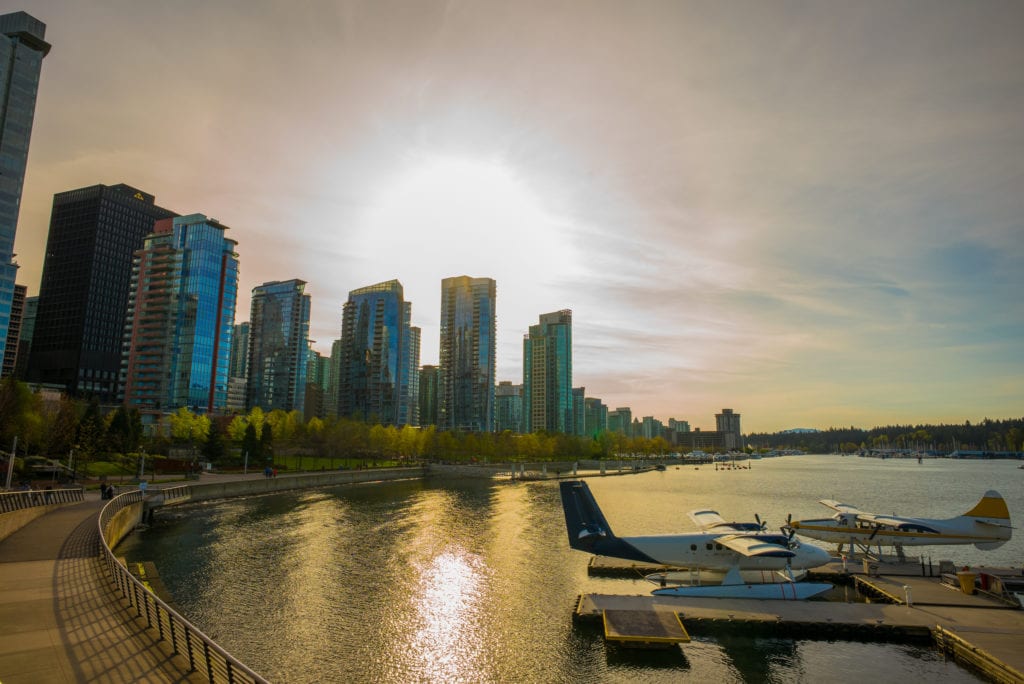
The Canadian province of British Columbia has exempted electric aircraft from provincial sales tax, a move beneficial to electric seaplane early-mover Harbour Air and potential urban air mobility operations in Vancouver.
Electric aircraft purchased in the Canadian province of British Columbia are now exempt from provincial sales taxes (PST), an incentive created by the government as part of its ‘CleanBC’ initiative to lower emissions. The exemption may also stimulate efforts in progress to bring urban air mobility, via electric air taxis, to the Vancouver region.
The tax exemption, a 7 percent savings, is a meaningful boon to Harbour Air, a seaplane operator based in Vancouver, which in December successfully flew a six-passenger DHC-2 de Havilland Beaver seaplane, outfitted with a 750-hp electric motor developed by magniX. The two companies, which are working to certify that propulsion system and the retrofitted seaplane, plan to convert Harbour Air’s entire fleet to electric propulsion.

Harbour Air and magniX successfully flew a DHC-2 de Havilland Beaver, retrofitted with a 750-hp magniX electric propulsion system, in December 2019. (Harbour Air)
“Effective February 19, 2020, electric aircraft are exempt from provincial sales tax,” the province’s 2020 budget release states. “In addition, a refund is added for provincial sales tax paid on or after February 19, 2020, in relation to non-electric aircraft obtained for the purpose of converting the aircraft to operate solely on electricity, as well as for provincial sales tax paid on parts and related services obtained for this purpose.”
Turbine aircraft were already exempt from PST in B.C., though non-turbine aircraft and related parts/materials are subject to the sales tax. For Harbour Air, this means approximately 25 of their 40 aircraft were already exempt from PST; the company operates 14 piston-engine DHC-2 Beavers, which will be exempt after undergoing electrification.
“Canada has had a longstanding history in aviation leadership, and we are proud to continue that forward-thinking legacy, but we can’t do it alone,” said Randy Wright, Harbour Air president. “This commitment by our governments to support local businesses and innovation, exemplifies the leadership and dedication required to make meaningful impact.”
A representative from British Columbia’s ministry of finance told Avionics International it hopes removing the PST from the costs to convert and maintain electric planes “will only further enhance new ideas and opportunities in this field and cement our province as a leader in this exciting and emerging industry.” The exemption also applies to aircraft leased and operated in the province, according to the ministry of finance.
It’s also a windfall for efforts to bring urban air mobility to Vancouver using electric air taxis, under development by Bell, Boeing, Airbus and a number of other manufacturers. Divided by a harbor with just two main bridges across, Vancouver is seen as a potential early-adopter of these aircraft for cargo and passenger transport. Locals are also more accustomed to helicopter and seaplane use than in Los Angeles and New York City.
“The inclusion of this exemption in the budget is a signal to the market that the government is not only here for electric aviation, but letting it flourish within British Columbia and Canada,” said J.R. Hammond, founder of Canadian Air Mobility — a private company leading efforts to bring urban air mobility to Canadian communities, beginning with Vancouver.
Michael Dyment, managing partner at Nexa Capital Partners, praised the provincial government’s tax exemption as part of an “aggressive plan to promote green transportation solutions” throughout British Columbia.
“NEXA believes that the entire Vancouver region will become North America’s first mover for UAM because industry and government are perfectly aligned to improve mobility using eVTOL technologies,” Dyment told Avionics.